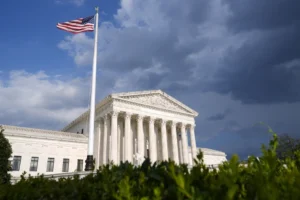Lummis Touts Need for Crypto Regs at Bitcoin Summit: ‘Time is of the Essence’
Wyoming’s junior senator will reintroduce her bipartisan cryptocurrency regulation package soon
- Published In: Politics
- Last Updated: Apr 28, 2023

Sen. Cynthia Lummis (R-Wyo.) delivered remarks Wednesday evening at the inaugural Bitcoin Policy Summit in Washington. (Photo via YouTube / Swan Bitcoin)
By Jacob Gardenswartz
Special to the Wyoming Truth
WASHINGTON — When it comes to issues of cryptocurrency and digital assets, no member of Congress has been more vocal than Sen. Cynthia Lummis (R-Wyo.).
She’s a cofounder of the Senate Financial Innovations Caucus and has been dubbed Washington’s “crypto queen.” Lummis speaks frequently about her own crypto investments, describing herself as a “HODLer”— someone who purchased bitcoin not to cash out immediately but to “hold on for dear life” as they accumulate value.
And in an appearance Wednesday evening at the inaugural Bitcoin Policy Summit, an invitation-only policy conference organized by the Bitcoin Policy Institute and cryptocurrency company Swan, Lummis stressed the need for urgent government action to regulate the sprawling digital asset industry.

“Time is of the essence,” Lummis told an audience of bitcoin investors, advocates and policymakers at Washington’s National Press Club. “The frustration that you encounter in dealing with the regulatory climate here in the US is going to push you abroad if we don’t get with the program.”
Bipartisan bill seeks to regulate crypto industry
Last June, Lummis introduced the Responsible Financial Innovation Act, a landmark digital asset regulation bill cosponsored by Sen. Kirsten Gillibrand (D-N.Y.). But the bill languished in committee, as many lawmakers were weary of taking any controversial action with the midterm elections just months away.
And as Washington University School of Law professor and cryptocurrency expert Joel Seligman wrote shortly after Lummis and Gillibrand’s measure was introduced, the senators’ timing “could not have been worse.” Between Nov. 2021 and June 2022, Seligman noted, global cryptocurrency capitalization fell by 69%.
But while some have argued that’s reason enough to stay away from the issue, Lummis said the industry’s volatility — coupled with crypto company FTX’s $32 billion collapse amid allegations of fraud — only “validate[s] the need for regulation in this space.”
“This has been a bit of a one step forward and two steps back experience,” Lummis conceded. “Because of what happened with FTX and other companies, we’re making a more robust penalty provision for illicit use and attempts to commit fraud on the consuming public.”
Though the final text of the new bill is still being ironed out, Lummis on Wednesday laid out its key provisions in the greatest detail to date. At its core, the bill seeks to make clear that “not all cryptocurrencies are alike,” she explained.
Should the measure become law, open-source digital assets such as bitcoin would be regulated as commodities (real goods like gold or oil) and not as securities (financial holdings like stocks, bonds and derivatives). By defining bitcoin and similar crypto assets as such, they’d shift from being regulated by the Securities and Exchange Commission (SEC) to the Commodity Futures Trading Commission (CFTC), a move widely seen as easing the regulatory scrutiny on everyday crypto holders.
“So we want to make sure that the SEC is involved, but not through enforcement actions, through the actual submission of information that can help a buyer, a consumer make an informed decision,” Lummis said.
One big issue: Congress doesn’t get crypto
Bringing about a regulatory overhaul of a burgeoning industry for the first time is tricky. But Lummis’ effort has been made all-the-more difficult by the complexities of cryptocurrency design and lawmakers’ lack of knowledge on the issue.
“We have 100 senators — I don’t know that there are five senators who could tell you what a bitcoin is,” said Sen. Ted Cruz (R-Texas), who also appeared at the Bitcoin Policy Summit.
“A lot of my colleagues think, ‘Well, if you’re doing bitcoin, you must be a drug dealer or doing money laundering, because that’s the only reason you want privacy over your financial affairs,’” he claimed. “And so I think we collectively need to tell a better story explaining the benefits.”
Among Cruz’s biggest fears is the creation of a Central Bank Digital Currency (CBDC), a digital liability made available by the Federal Reserve to the general public in a similar manner to how conventional central bank currency is managed. Though the U.S. has yet to decide whether to pursue such a program, officials have noted they’re currently exploiting the creation of one.
“I hope we see growing resistance to a CBDC,” Cruz told attendees at the summit. “At a minimum, if we were to do it, it should be Congress making that decision elected by the people, not Federal Reserve governors that have no accountability to the American people.”
Lummis in her remarks said she’s similarly “opposed” to such a move. Though last year’s version of her bill proposed a study of CBDCs, she said that may be left “on the cutting room floor” in the soon-to-be-released one.
Legislative tweaks to ensure passage
Finding the votes to pass such a measure will be a heavy lift, no doubt, but one especially difficult for Democrats, Lummis predicted. “There’s more resistance in [Gillibrand’s] party to something that was not created by government and that government cannot control,” she said.
Nonetheless, Lummis described her Democratic counterpart as a “valiant advocate” for the measure, praising her attempts to work with regulatory officials in President Joe Biden’s administration to earn their support.
And despite being aligned with some of the most conservative lawmakers in the Senate, Lummis stressed her desire to create a compromise that is feasible and — importantly — has real potential to become law.
“We want something that will pass,” she said. “I don’t want to get in a spitting contest with the House of Representatives. I don’t want to separate the House from the Senate, the Democrats from the Republicans. I want something that is workable for this industry that will not stifle innovation.”
Beyond beefing up enforcement mechanisms for bad actors like FTX, among the changes likely to be included in the new measure are increased consumer protection provisions and new tax components.
Above all else, though, Lummis stressed her belief in cryptocurrencies’ ability to enable everyday people and those shut out from the traditional banking system to enter the asset trading market, bringing about a new era of global commodities exchange.
Lummis sees her role as helping make the case for “how important this asset is going to be globally to people of all means: the rich, the poor, the banked, the unbanked, the Native Americans who don’t trust non-Indian banks, the people that live in governments that are corrupt.”
“These assets can help individual people control their own money and have an asset that is going to withstand the test of time,” she said in conclusion.













